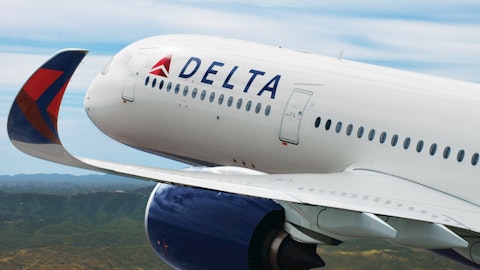Alison Sider: Hi, thanks so much. I just wanted to see what you made of a center of Duckworth today calling on the FAA to deny the waiver Boeing of Sox to MAX 7. Is that anti-ice issue, do you think that something Boeing should have to address before they can start delivering those planes?
Bob Jordan: I’ll start, and Andrew, you’ll file in, Ali. Obviously, the certification of the MAX 7 and the issue there, that’s really Boeing. I don’t want to speak for Boeing or get ahead here. Obviously, we want the MAX 7 and we want it on the best timing possible. So I don’t want to talk for Boeing, but it is one more thing to consider here in the certification process and certification time line.
Andrew Watterson: I would say that the certification is a technical process between the FAA and Boeing. And I think they’ve been doing a good job. It’s been slower than we would like, but it’s been technically based and it’s off a public comment. So it’s an opportunity for people to comment on that for technical analysis to be done. And so we’re not a party to that. We want the aircraft. It’s a question of when we’ll get it, not if we’ll get it. So we’re pleased that they’re taking their time to make sure it’s safe and we support whatever way the FA wants to go.
Alison Sider: And I mean do you have any plans to increase your own oversight of Southwest Plans on the Boeing production line?
Andrew Watterson: We have already done that. So in late 2022, we changed our posture up there. Previously, we had for a long time, they have representatives at the factory. We increased it to a team of AMP license mechanics, whose job is to provide oversight of our aircraft in the production process. The Boeing provides customer quality people that are on their payroll, but our direction. And so they inspect at places where we ask in the factory the few days that Boeing takes to assemble an aircraft from the wings being built to rolling out. It’s about roughly 80 areas where we have our requirements for things to be expected. Those people inspect — our people inspect. And then several times a year, our quality assurance team goes up and inspect our inspectors to make sure everything is going well.
So that provides a really good oversight in the production process once it leaves the factory, there’s a customary acceptance in spectrums that happened the FAA overseas and give a final certificate of air worthiness. And then it comes on to our ops spec and we in our maintenance program, which is quite robust. And since we’re by far the largest operator of the 737, we have provided lots of data and our continuing analysis and safety surveillance system allows for us to really understand the aircraft and make sure that it’s performing and conforming as expected.
Alison Sider: Thanks.
Operator: The next question is from Leslie Josephs with CNBC. Please go ahead.
Leslie Josephs: Hi. I was wondering if you have any thoughts about how a Chapter 7 of an airline in the United States would affect the industry? Are there jobs for those employees should that happen? And then do you think that the Justice Department would ever let you buy another airline?
Bob Jordan: Hey, Leslie, it’s Bob. We don’t — obviously, like I said earlier, there is a lot going on in the industry. They’re between merger potential mergers and acquisitions and issues with aircraft deliveries, the geared turbofan, I don’t know in my 36 years in the industry. I’ve seen more moving parts as you have right now. One thing that’s consistent here is we stick to our business. So we’re focused on Southwest Airlines, improving Southwest Airlines being the best carrier that we can be improving our returns and profit and margins, all the things that we’ve talked about. It’s impossible to speculate on what might happen. Our history would say that as opportunities arise for Southwest, if they make sense, we take a look at that. But I wouldn’t want to speculate on anything going on in the industry, certainly around any other carrier.
Andrew Watterson: I think with the benefit for Southwest Airlines, Bob, is that we have a plan and we control our destiny. We hit our plan, we get our returns where we need to be. We don’t need something to break our way to judge or anything else or rule anything. Our plan delivers our results.
Operator: Our next question comes from Rajesh Singh with Reuters. Please go ahead.
Rajesh Singh: Hi. Andrew, do you have any update on the time line for certification of MAX 7. Earlier, it was expected by April. So do you see any risk of the certification process getting slowed down due to the current events with Boeing?
Andrew Watterson: Well, we get weekly updates on the status of the certification process. So we know what’s been submitted and what hasn’t. But obviously, then the FAA is the one who oversees that and inspect it makes ultimate decision previously, we’ve indicated that we had — in our internal plan and assumption that it would be certified by April and that we would then spend time after of that. I think on our of spec that could take us at the end of the year, and therefore, it would be flat until next year. But that is — that was only the latest assumption. We’ve had earlier assumptions all along this process. And as Tammy mentioned, we will modify our plan based on the new information. So should that change, we will move our assumptions and adapt our plan. So by this kind of conservative approach and giving ourselves the lead time, we won’t let any kind of short-term ups or downs affect what we have planned for this year.
Rajesh Singh: And Bob, I have question for you. Do you have confidence in Boeing’s currently sit to address place who’s facing the company?
Bob Jordan: Hey, Rajesh, Boeing has been a partner with us for 52 years. And I have absolute confidence that between the FAA oversight work that’s going on, the work that Boeing is doing that Boeing will working with the FAA will address the quality issues, and we’ll obviously come out of this a better company. I’ve talked personally to their leadership. They’re committed to doing anything and everything it takes to be better and to address the problems. And as I said before, a better Boeing is very good for Southwest Airlines. So yeah, I have absolute confidence that they will work their way through this and address the issues.
Rajesh Singh: Thank you.
Bob Jordan:
Operator: This concludes our question-and-answer session. I would like to turn the conference back over to Ms. Eichinger for any closing remarks.
Whitney Eichinger: Thanks, Gary. The news release and our contact information are available at swamedia.com. We thank everyone for joining.
Operator: The conference has now concluded. Thank you for attending today’s presentation. You may now disconnect.
Follow Southwest Airlines Co (NYSE:LUV)
Follow Southwest Airlines Co (NYSE:LUV)
Receive real-time insider trading and news alerts





